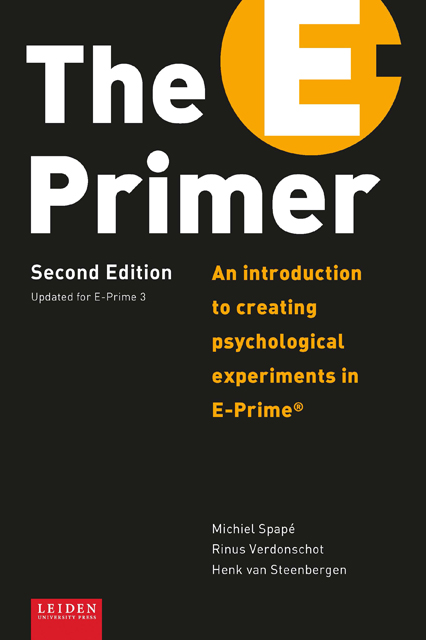Book contents
- Frontmatter
- Table of Contents
- Preface to the Second Edition
- Preface to the First Edition
- Introduction
- Chapter I E-Prime at a glance
- Chapter II List Attributes and Slides
- Chapter III Sound, movies, hardware, and nested Lists
- Chapter IV Beginning programming in E-Prime
- Chapter V Decision making in E-Basic
- Chapter VI Loops and Arrays in E-Basic
- Chapter VII Interactions between Slide objects and the Mouse
- Chapter VIII Various Input/Output devices
- References
- Appendix: Overview of available E-Objects
- About the authors
- Index
Preface to the First Edition
Published online by Cambridge University Press: 22 November 2022
- Frontmatter
- Table of Contents
- Preface to the Second Edition
- Preface to the First Edition
- Introduction
- Chapter I E-Prime at a glance
- Chapter II List Attributes and Slides
- Chapter III Sound, movies, hardware, and nested Lists
- Chapter IV Beginning programming in E-Prime
- Chapter V Decision making in E-Basic
- Chapter VI Loops and Arrays in E-Basic
- Chapter VII Interactions between Slide objects and the Mouse
- Chapter VIII Various Input/Output devices
- References
- Appendix: Overview of available E-Objects
- About the authors
- Index
Summary
This book is the result of intensive collaboration between people who, at one time or another, all studied or worked at Leiden University in the Netherlands. In 2006, we expanded a collection of E-Prime exercises into something resembling a coherent course. In subsequent years, we – initially as a rather dynamic collective of PhD students – revised the manual in order to help those who want to learn how to create their own psychological experiments. Later, we expanded the manual even further, so that it can now also serve as a basic introduction to E-Basic coding in E-Prime.
Along the way, many people helped us in the writing of this book. First, we would like to thank David McFarlane, Michael Richter, Kerstin Brinkmann and the people at Psychology Software Tools for providing helpful comments when reviewing an earlier draft of this book. There were also numerous students who provided useful feedback during the period when this book was being used for courses at Leiden University. In particular, we would like to thank Hans Revers and Erwin Haasnoot for their constructive comments. Many more people have joined our journey, but at different moments in time. Each of us would like to mention a few:
Michiel Spapé: “Thanks, Elkan Akyürek, for introducing me to E-Prime, and Jan-Rouke Kuipers for sharing the burden when we took over and redesigned the course. I am also grateful to many inspiring teachers and colleagues at Leiden University (Wido La Heij, Gezinus Wolters, Stephan Verschoor). Finally, thank you, Zania Sovijärvi-Spapé, for being my favourite test-subject and person.”
Rinus Verdonschot: “I am grateful to the Cognitive Psychology department of Leiden University for having given me the chance to teach E-Prime to so many enthusiastic students; also to the people who participate actively in the Google E-Prime group and thus help out researchers all over the world. Lastly, a big thank you to my family, friends and colleagues.”
Saskia van Dantzig: “I’d like to thank Diane Pecher, who introduced me to E-Prime and encouraged me to develop the E-Prime course for psychology students at the Erasmus University. That course supplemented several chapters of this book. Diane was also one of the reviewers of this book.
- Type
- Chapter
- Information
- The E-PrimerAn Introduction to Creating Psychological Experiments in E-Prime, pp. 11 - 12Publisher: Amsterdam University PressPrint publication year: 2019



